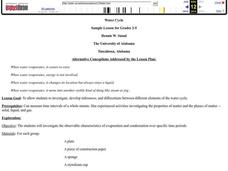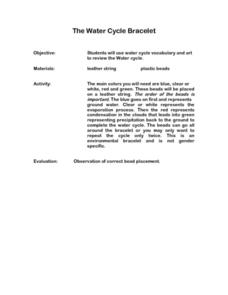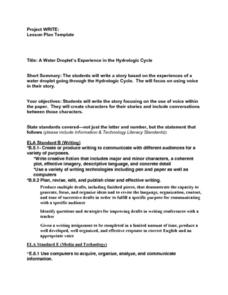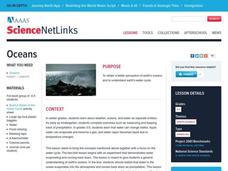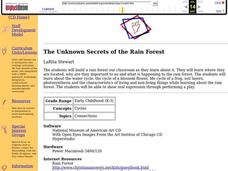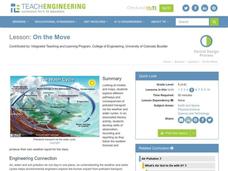Curated OER
The Water Cycle: A Repeating Pattern in Nature
Students are introduced to the terms related to the water cycle in their native language. In groups, they describe the steps of the cycle using different materials found in their art classroom. They describe how energy helps water...
Curated OER
Water Cycle
Students investigate, develop inferences, and differentiate between different elements of the water cycle. They investigate the observable characteristics of evaporation and condensation over specific time periods
Curated OER
The Water Cycle Bracelet
Students participate in a creative project in order to investigate the water cycle. They create a bracelet with different colored beads that represent the concept and the order of its occurrence. Students are evaluated according to the...
Curated OER
Air and Water in the Environment
Second graders participate in a three part lesson in which they identify and describe forms of moisture in the environment. Part one of the lesson involves the three stages of the water cycle, part two focuses on creating humidity by...
Curated OER
Water Cycle Drama
Young scholars explore the water cycle. In groups, students choose a card and then pantomime the picture depicted on the card. Other group members guess the name of the cycle being performed. As a class, young scholars share the numerous...
Curated OER
A Water Droplet's Experience in the Hydrologic Cycle
Students write a story from the perspective of a water droplet on a journey through the water cycle. They use the 6+1 Traits writing method to focus on voice in the writing as they create characters that their water droplet has...
Curated OER
Condensation and the Water Cycle
Students explore the natural distallation process that occurs in the water cycle. They use plastic cups and cotton swabs to observe the condensation process that is evident in the water cycle.
Curated OER
Water Issues on Puerto Rico and Oahu: A Comparison of Two Islands
Fifth graders explore how the tow islands receive and use fresh water. They also address some of the threats to the fresh water supply on each island. Students explore the lesson objectives through water cycle models and experiments.
Curated OER
The Rain Maker
Second graders work in small groups with a cup each of several materials. Students layer the gravel, sand, and water into a resealable bag. They draw a picture of this bag in their water journal. Students place their sealed bags in a...
Curated OER
Models of the Water Cycle
Students describe and review the stages in the water cycle. In groups, they build their own models of the water cycle and demonstrate where the water goes in a closed system. They answer discussion questions after the experiment to end...
Curated OER
Oceans
Students use their prior knowledge to being their examination of the water cycle. In groups, they complete an experiment in which they can see water evaporating and coming back to the ground. They discover the ocean's water evaporates...
Curated OER
Domestic Water Supply Case Study
Students follow the cycle of a raindrop from its source into the water supply for their houses and then back to the environment. They draw and, properly label and explain a diagram of a water treatment plant and a sewage treatment plant.
Curated OER
Barometer Investigation
Students construct a barometer to use in an experiment that they design to measure the air pressure on a daily basis. These observations of air pressure allow students to determine how weather is affected when a storm is approaching and...
Curated OER
Forest Floor Terrarium
Students study the aspects of a forest floor ecosystem, including decomposition, the water cycle, food webs, the needs of living things, and physical vs. chemical change over an extended period. In addition, students conduct observations...
Curated OER
The Water Cycle
Learners describe the water cycle. Students identify the processess in the water cycle. They draw an illustration of the water cycel with arrows showing the path water takes through the cycle. Learners label condesation, precipitation,...
Curated OER
The Unknown Secrets of the Rain Forest
Learners listen to the story "The Great Kapok" then discuss characteristics of the rain forest. They make several different types of rain forest animals from paper plates (ex. sloth, tigers, monkeys etc) and design costumes for a...
Curated OER
Moving without Wheels
Students observe a simple water cycle model to better understand its role in pollutant transport. This activity shows one way in which pollution is affected by the water cycle; it simulates a point source of pollution in a lake and the...
Curated OER
The Magic School Bus Wet All Over Clean-up!
Students investigate the water cycle using activities from The Magic School Bus series. They determine what happens when water is heated and cooled by observing two different experimental set-ups.
Curated OER
The Water Cycle
Seventh graders discover how water circulates through the earth and its atmosphere while determine how much of the Earth's water is suitable for drinking. They discover the meaning of evaporation, transpiration, and precipitation and...
Curated OER
Water Cycle Relay
Students review the steps in the water cycle by playing a game to fill in the missing words in the cycle. Students read a water cycle riddle and decide which word best fits the riddle.
Curated OER
The Water Cycle Dance
Second graders synthesize the four parts of the water cycle by participating in a water cycle dance. They perform movements that signify each stage of the cycle.
Curated OER
On the Move
Students explore different pathways and consequences of pollutant transport via the weather and water cycles. They observe and record weather information and produce their own weather report for the class.
Curated OER
Rain, Rain, Go Away
Students conduct a number of experiments involving evaporation and condensation. They view and discuss a video about the water cycle and then design posters about the rain based on the book "Cloudy With A Chance of Meatballs".
Curated OER
The Water Cycle - Family Page
Students discuss the steps of the water cycle. They create their own model of the water cycle. They complete the Family Page at the end of the lesson.

